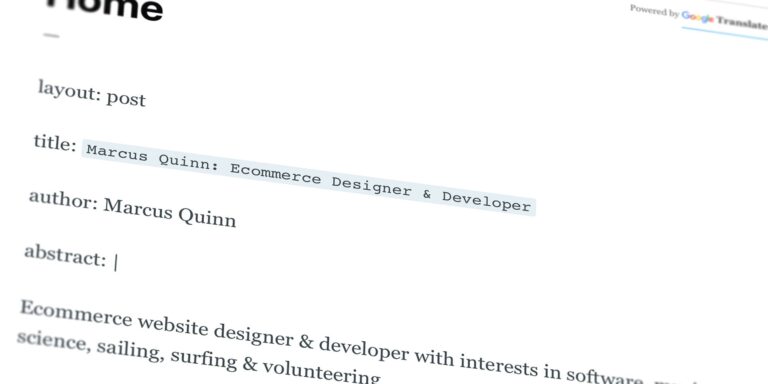Introducing Ghost for your blog 👻 – a thread (1/7)
Anyone can blog, and almost everyone should — we only get once chance to make a first impression! These Ghost posts will give you an idea of how easy & enjoyable personal blogging can be, how to make a site like this one, and it saves repeating ourselves! So, get creating, and share your story. ✍️

Preamble
Note; a simpler version of these posts is included with all Ghost installs to explain its features by example.
Since they are so useful, I’ve extended and refined them — to help encourage you to use this blog as inspiration and encouragement for creating your own.
This thread will show you how thoughtful Ghost‘s creators have been; in making blogging simpler, quicker, and user-friendly on all devices.
Your blog is something for you — to collect and focus your thoughts with all those you wish to share in your journey.
It’s a great way for people to learn more from your insights, musings and creations, through your various bio links and posts — and for you to learn more about your audience’s interests, too, in discussion on the platforms people go to for a chat on their favourite subjects…
A few things to know about Ghost
- Ghost is designed for creators, influencers, and personal or professional publishers. It’s a content hub, and link garden — to entertain, educate and grow a direct and personal audience for your experiences and inspirations.
- The entire platform can be styled and customised to suit you. It’s very powerful, but some customisation can occasionally require at least an awareness of a little code, too. Don’t worry though, it’s all documented, can be as simple as copy & pasting examples, perhaps with a change or two of your site-specific credentials. Plus, there’s a great community of people that enjoy helping fellow publishers, everyone was new once, just ask and let people know when their help worked and could help another person with the same questions.
- Ghost also work with many popular tools & apps, with hundreds of simple integrations to; speed up your workflows, connect email lists, build communities and more — as we will now discover!…
Ghost doesn’t have any plug-ins — I see this as a good thing — nothing else to think about, test, trust, update or potentially break your site. Keeping you focused on your content curation!
Ghost doesn’t have comments, likes or share buttons either, I also see that as a good thing, your blog should be an interactive evolving biography. There are other places for chatting about things; openly with a wider audience, or in private messages.
If you’re looking for discussion on your articles; post a link and introduce yourself on one of the many platforms (like Twitter, Reddit, LinkedIn etc) — where people are there to chat. You can broaden your audience and credibility with a community of peers, the moderation is already managed for you, and you’ll attract more followers for your other articles that people can more easily search here.
Behind the scenes
Ghost is made by an independent non-profit organisation called the Ghost Foundation. 100% self funded by revenue from the Ghost (Pro) hosting service, and every penny is re-invested into funding further development of free, open-source technology for modern publishing.
The version of Ghost you are looking at right now would not have been possible without generous support from the open-source community & contributors.
Open source is important for security and trust. Sustainable open-source organisations are good for long-term adoption and refinement of the technologies they are based on — you are in good creative company here.
It’s just one of many great of examples, of a secure and successful open source first project and philosophy (as we have also aspired to with my ecommerce work at Brandlight.org).
The code is free, open, popular, and anyone can use or review it.
The business model for the creators is in the hosting services, personalisation and enterprise support, which makes it all self-sustaining and likely to be around for a very long time.
The world gets a free product. The Foundation gets a percentage of them paying for their hosting services too.
All the free users still pay back the developers with their testing, user stories, feedback, and requests — a developer’s second-most valuable resource! (After hot beverages 😊)
Why being an open-source platform matters
Open-source software often has far more; qualified peer-review, user-suggestions, and rapid improvements than could ever be achieved with a close-source product. Hence, closed-source products typically need to borrow from capital markets, and charge a premium to pay for higher overheads and returns to their investors. The user pays that premium for the many layers of interest, and it generally locked-in to that one provider to pay in perpetuity.
Open-source development means you can host the product with the author’s service or any other provider you like more. Developers work for quality and user-first iteration to attract adoption and continual improvement. Their remuneration typically being for the reservation of hosting resources, and retaining of priority and unique customisation support needs, direct from its most experienced creators and advocates.
This is the direct expert support you benefit most from, and don’t mind respectfully investing in the creator for anyway. If you want something they aren’t prioritising, you can always commission a developer familiar with the stack, and add your variations without limitation.
Closed source development being the anti-thesis, therefore typically works for itself, its developers and owners, with the user being a commodity to maximise income from through usage and update or renewal subscription.
Since revenue is for user-count, the motivation for unique support and customisation is secondary, and typically offloaded to the secondary value-adding reseller sector working on commission for sales and up-selling customisations. You simply can’t fix or change anything unless the owner approves — and if they don’t, you’re stuck with all or nothing.
All those software-as-a-service (SaaS) products and companies usually have to charge more to pay for quality-control with a team of employees, and all the other costs of patents, licences, sales, and marketing. You will be quite miffed if they change their business model, pricing, or products cease to exist. Your data is locked-in with proprietary structures, and setups, meaning later migrations can be quite costly and distracting — so better not to choose to be locked-in, especially when you have so many open alternatives nowadays.
This is why free in open-source stands for freedom.
And why we are free & open-source champions here — a much happier, worry-free place to be!
Next up, the editor
The main thing you’ll want to see, and will use more than anything else, is the Ghost editor. This is where the good stuff is made…
To follow my online adventures — with commentary on; creative technology, building a brand, ethical business, copywriting, ecommerce, blogging, SEO, data protection, privacy, and online security — find me on X.com…







